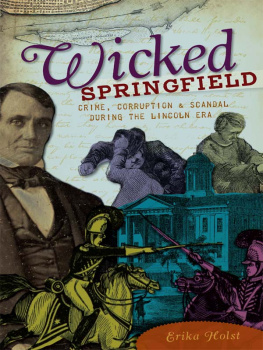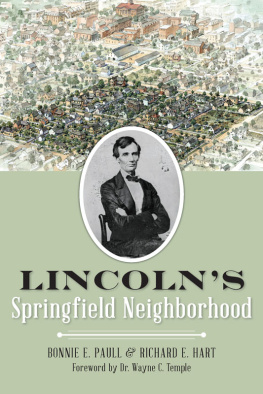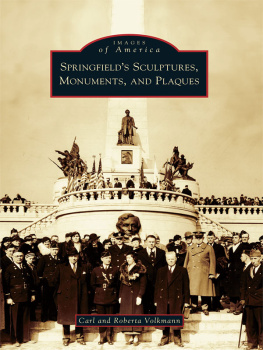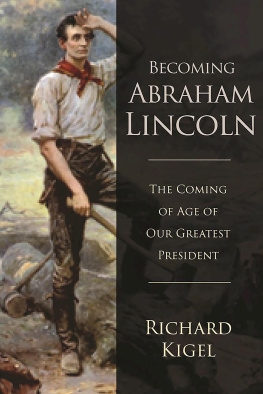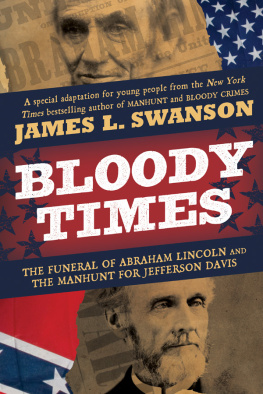

Published by The History Press
Charleston, SC 29403
www.historypress.net
Copyright 2010 by Erika Holst
All rights reserved
First published 2010
e-book edition 2012
ISBN 978.1.61423.418.0
Holst, Erika.
Wicked Springfield : crime, corruption, and scandal during the Lincoln era / Erika Holst.
p. cm.
Includes bibliographical references.
print edition ISBN 978-1-59629-901-6
1. Crime--Illinois--Springfield--History--19th century--Anecdotes. 2. Corruption--Illinois--Springfield--History--19th century--Anecdotes. 3. Scandals--Illinois--Springfield--History--19th century--Anecdotes. 4. Criminals--Illinois--Springfield--History--19th century--Anecdotes. 5. Lincoln, Abraham, 1809-1865--Anecdotes. 6. Springfield (Ill.)--History--19th century--Anecdotes. 7. Springfield (Ill.)--Biography--Anecdotes. 8. Springfield (Ill.)--Social conditions--19th century--Anecdotes. I. Title.
HV6795.S67H65 2010
364.10977356--dc22
2009050778
Notice: The information in this book is true and complete to the best of our knowledge. It is offered without guarantee on the part of the author or The History Press. The author and The History Press disclaim all liability in connection with the use of this book.
All rights reserved. No part of this book may be reproduced or transmitted in any form whatsoever without prior written permission from the publisher except in the case of brief quotations embodied in critical articles and reviews.
CONTENTS
INTRODUCTION
This book is not about Abraham Lincoln and his virtues. It is about Lincolns hometown and its vices. Lincoln arrived in Springfield, Illinois, in the spring of 1837 as an up-and-coming young lawyer with all his worldly possessions tucked into two saddlebags. Springfield was up-and-coming, too: it had just been selected the permanent capital of Illinois by the state legislature. The town, like the entire West (and Illinois was considered the West in Lincolns time), hummed with promise, attracting politicians, lawyers, merchants, farmers, ladies, craftsmen and innumerable others in search of possibility and prosperity. It also attracted drifters, con artists, roustabouts and criminals in search of mischief or an easy mark; the editor of the Springfield Illinois Republican worried that the new state capital would bring rowdyism and brawling to the streets. By the time Lincoln departed in February 1861 as the newly elected president of the United States, Springfield had had its share of scandals, crimes, brawls and intrigues.
Wickedness came in all forms in Lincolns Springfield. As capital, it was always a hotbed of politics, and sometimes that bed got too hot for comfort. Candidates often hurled insults and accusations at one another. Occasionally they hurled fists. And every so often, they hurled something deadlier. Being elected to office was no cure for wrongdoing, either. Illinois long tradition of crooked governors goes all the way back to Lincolns day.
This is not to say that politicians cornered the market on scandal. There were plenty of everyday citizens who ran afoul of the law and committed crimes that ran the gamut from murder to sexual deviancy, not to mention the handful of citizens who stayed on the right side of the law but nevertheless kept African Americans in slavery or near slavery. Right there in the Great Emancipators hometown.
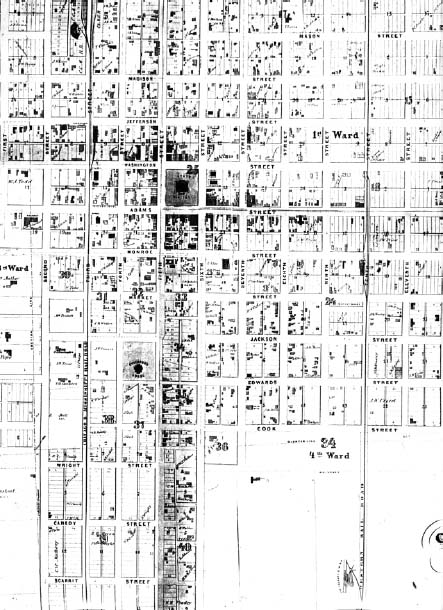
Abraham Lincolns Springfield, Illinois. Courtesy of the Sangamon Valley Collection, Lincoln Library, Springfield, Illinois.
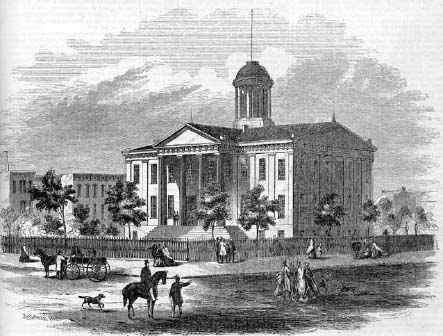
Abraham Lincoln arrived in Springfield the same year it was named Illinois new state capital. Courtesy of Ballous Pictorial Drawing-Room Companion, November 15, 1856.
Lincoln even had a scandal of his own, back in his early days before time and experience smoothed away some of his rough edges. He had the bad habit of making personal attacks on his political rivals, using humor and mockery to skin people who often had no sense of humor when it came to their own shortcomings. That is, until one of his humorless victims had enough and challenged him to a duel.
Although Lincoln was by and large innocent of any wicked or salacious acts, he was surely aware when they were committed in his town. The stories in this book filled the newspapers that he read and the court docket in which he practiced law. Oftentimes the people involved were his legal clients. Sometimes they were his friends or political allies. All of it was part of the fabric of the community in which Lincoln lived. Welcome to Abraham Lincolns wicked Springfield.
Chapter 1
POLITICAL BRAWLS
Politics dominated the cultural landscape of Lincolns Springfield in a way that can scarcely be imagined today. Andrew Jacksons brand of democratic politics had opened the door wide to popular participation. No longer were candidates nominated by cabals of political elites and quietly elected by propertied men. In the new era of the common man, politics became a rollicking, contentious, boisterous affair.
Lincoln arrived in Sangamon County at the dawn of this new political era. By the late 1830s, the citizens of Springfield and the surrounding countryside were fiercely divided into two political parties, the Whigs and the Democrats. Whigs believed in an economic policy built around internal improvements such as roads, canals and railroads. They favored a protective tariff on American goods and a strong national bank. They idealized their leader, Henry Clay, and loathed their chief opponent, Andrew Jackson. Lincoln was a Whig. Democrats, by contrast, were less interested in modernizing the countrys interior than they were in expanding its borders westward. They were opposed to the national bank and to anything smacking of elitism and favored of the common man.
Political meetings of this time had something of a holiday feel. A typical rally would draw hundreds or thousands of citizens from the surrounding area to wave banners and listen to speeches and debates, eat barbecue, visit with neighbors and heckle opponents.
Newspapers were also cornerstones of the political culture. The concept of objectivity in reporting was unheard of. Rather, most towns had at least two newspapers, Democrat and Whig, each fiercely loyal to its party and utterly scornful of its rival. A meeting heralded as a great success drawing thousands of spectators by the Whig paper might be dismissed as a fizzle attended by a few dozen morose souls by the Democratic paper. Most politicians were on excellent terms with the editors of their partys paper and often contributed anonymous editorials or pseudonymous lettersa practice Lincoln engaged in frequently and that occasionally landed him in hot water.
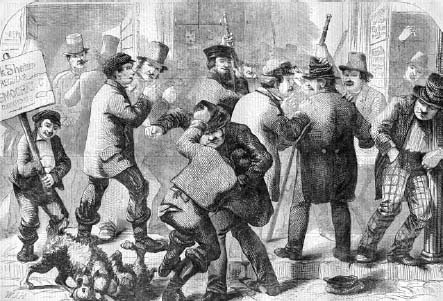
Politics in Lincolns time stirred up strongoccasionally violentfeelings. Courtesy of Harpers Monthly, November 7, 1857.
Occasionally, political feelings ran too hot and trouble ensued. All too often, a political barb would cross the line into a personal insult, and all too often a violent reaction would result. What follows are three of the most memorable political brawls from Lincolns Springfield.
Next page
